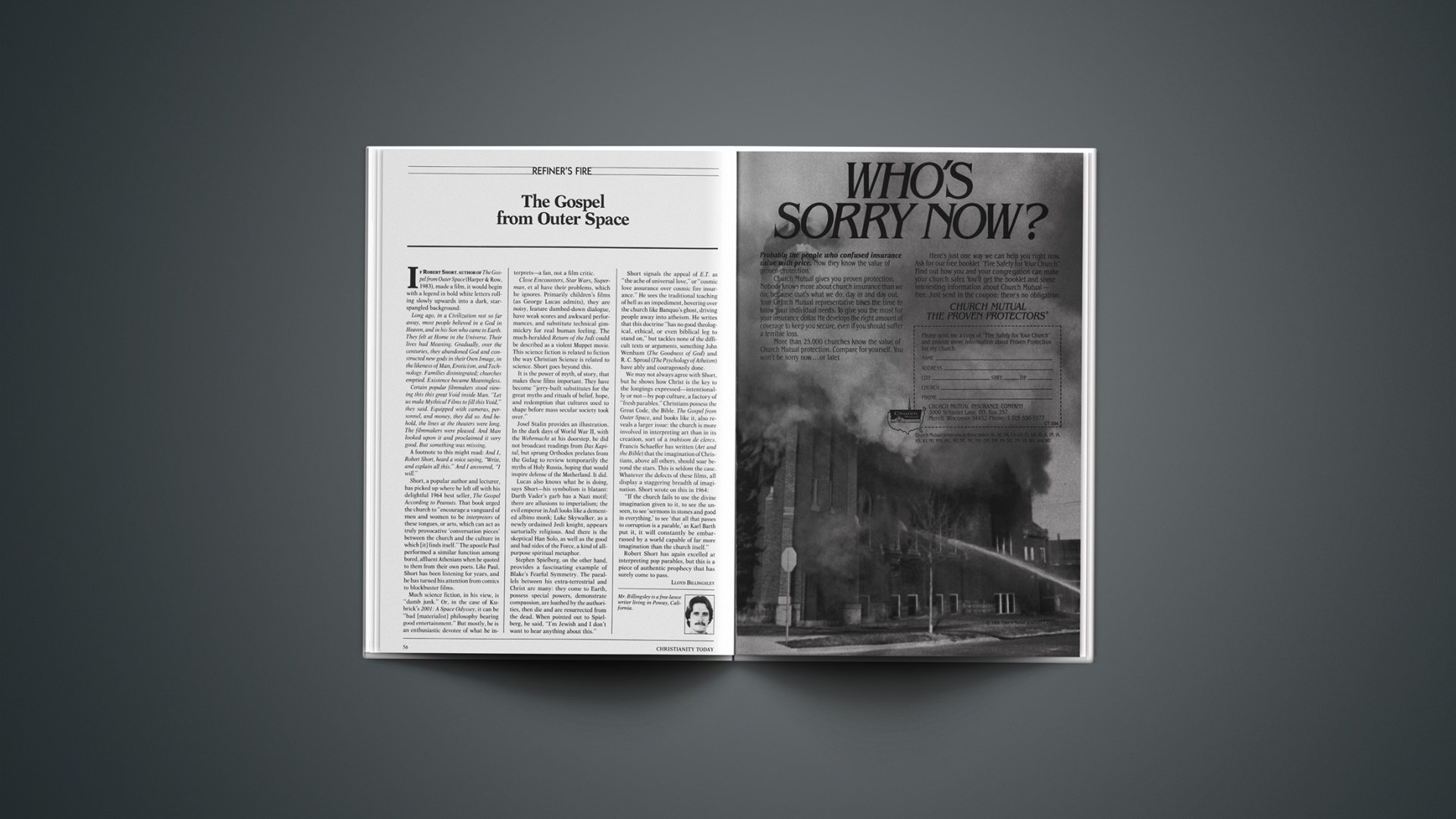If robert short, author of The Gospel from Outer Space (Harper & Row, 1983), made a film, it would begin with a legend in bold white letters rolling slowly upwards into a dark, star-spangled background:
Long ago, in a Civilization not so far away, most people believed in a God in Heaven, and in his Son who came to Earth. They felt at Home in the Universe. Their lives had Meaning. Gradually, over the centuries, they abandoned God and constructed new gods in their Own Image, in the likeness of Man, Eroticism, and Technology. Families disintegrated; churches emptied. Existence became Meaningless.
Certain popular filmmakers stood viewing this this great Void inside Man. “Let us make Mythical Films to fill this Void,” they said. Equipped with cameras, personnel, and money, they did so. And behold, the lines at the theaters were long. The filmmakers were pleased. And Man looked upon it and proclaimed it very good. But something was missing.
A footnote to this might read: And I, Robert Short, heard a voice saying, “Write, and explain all this.” And I answered, “I will.”
Short, a popular author and lecturer, has picked up where he left off with his delightful 1964 best seller, The Gospel According to Peanuts. That book urged the church to “encourage a vanguard of men and women to be interpreters of these tongues, or arts, which can act as truly provocative ‘conversation pieces’ between the church and the culture in which [it] finds itself.” The apostle Paul performed a similar function among bored, affluent Athenians when he quoted to them from their own poets. Like Paul, Short has been listening for years, and he has turned his attention from comics to blockbuster films.
Much science fiction, in his view, is “dumb junk.” Or, in the case of Kubrick’s 2001: A Space Odyssey, it can be “bad [materialist] philosophy bearing good entertainment.” But mostly, he is an enthusiastic devotee of what he interprets—a fan, not a film critic.
Close Encounters, Star Wars, Superman, et al have their problems, which he ignores. Primarily children’s films (as George Lucas admits), they are noisy, feature dumbed-down dialogue, have weak scores and awkward performances, and substitute technical gimmickry for real human feeling. The much-heralded Return of the Jedi could be described as a violent Muppet movie. This science fiction is related to fiction the way Christian Science is related to science. Short goes beyond this.
It is the power of myth, of story, that makes these films important. They have become “jerry-built substitutes for the great myths and rituals of belief, hope, and redemption that cultures used to shape before mass secular society took over.”
Josef Stalin provides an illustration. In the dark days of World War II, with the Wehrmacht at his doorstep, he did not broadcast readings from Das Kapital, but sprung Orthodox prelates from the Gulag to review temporarily the myths of Holy Russia, hoping that would inspire defense of the Motherland. It did.
Lucas also knows what he is doing, says Short—his symbolism is blatant: Darth Vader’s garb has a Nazi motif; there are allusions to imperialism; the evil emperor in Jedi looks like a demented albino monk; Luke Skywalker, as a newly ordained Jedi knight, appears sartorially religious. And there is the skeptical Han Solo, as well as the good and bad sides of the Force, a kind of all-purpose spiritual metaphor.
Stephen Spielberg, on the other hand, provides a fascinating example of Blake’s Fearful Symmetry. The parallels between his extra-terrestrial and Christ are many: they come to Earth, possess special powers, demonstrate compassion, are loathed by the authorities, then die and are resurrected from the dead. When pointed out to Spielberg, he said, “I’m Jewish and I don’t want to hear anything about this.”
Short signals the appeal of E.T. as “the ache of universal love,” or “cosmic love assurance over cosmic fire insurance.” He sees the traditional teaching of hell as an impediment, hovering over the church like Banquo’s ghost, driving people away into atheism. He writes that this doctrine “has no good theological, ethical, or even biblical leg to stand on,” but tackles none of the difficult texts or arguments, something John Wenham (The Goodness of God) and R. C. Sproul (The Psychology of Atheism) have ably and courageously done.
We may not always agree with Short, but he shows how Christ is the key to the longings expressed—intentionally or not—by pop culture, a factory of “fresh parables.” Christians possess the Great Code, the Bible. The Gospel from Outer Space, and books like it, also reveals a larger issue: the church is more involved in interpreting art than in its creation, sort of a trahison de clercs. Francis Schaeffer has written (Art and the Bible) that the imagination of Christians, above all others, should soar beyond the stars. This is seldom the case. Whatever the defects of these films, all display a staggering breadth of imagination. Short wrote on this in 1964:
“If the church fails to use the divine imagination given to it, to see the unseen, to see ‘sermons in stones and good in everything,’ to see ‘that all that passes to corruption is a parable,’ as Karl Barth put it, it will constantly be embarrassed by a world capable of far more imagination than the church itself.” Robert Short has again excelled at interpreting pop parables, but this is a piece of authentic prophecy that has surely come to pass.
Mr. Billingsley is a free-lance writer living in Poway, California.










